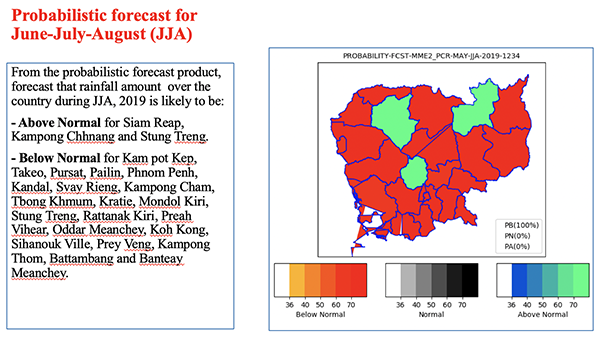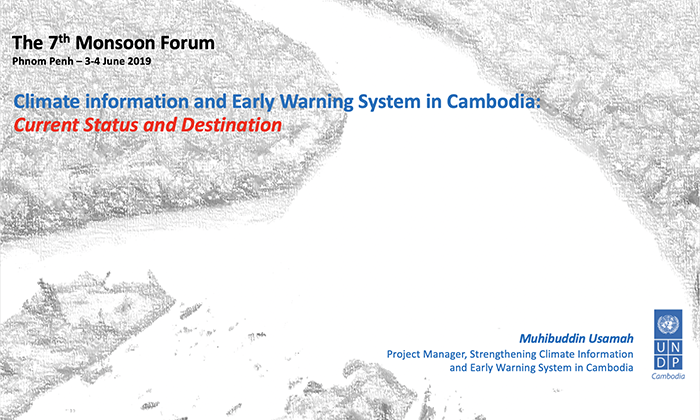Happening this week: #Cambodia’s Monsoon Forum / National Climate Outlook Forum! Our #EWS project with #RIMES finally can advance the 3-day city-based forecast on https://t.co/6T4dss5tOq moving towards medium, long & extended range: https://t.co/aWTMCMV6BW. #climateaction @theGEF pic.twitter.com/ilERDYVQpv
— MuhiUsamah (@muhiusamah) June 3, 2019
Phnom Penh, 12 June 2019 – Government officials and international development actors have gathered in Cambodia’s capital Phnom Penh to discuss improving seasonal forecasting and to prepare the agriculture, fisheries, health & water sectors for the monsoon season ahead. The forum is the first of two planned this year, with another to follow in October or November.
Attended by key ministries and departments as well as NGOs, the two-day forum, June 3-4, was coordinated by the UN Development Programme with the Regional Integrated Multi-Hazard Early Warning System for Africa and Asia (RIMES) and Department of Meteorology and Department of Hydrology and River Works.
The forum examined climate trends across the country; existing climate information products and services; sectoral experiences and requirements following the 2019 monsoon season, and current seasonal outlook and preparedness planning.
Crucially, the agenda also focused on Cambodia’s early warning system gaps, climate information requirements and dissemination, relevant policies and institutional frameworks, and what programmes and projects exist in relation to developing early warning, climate change adaptation linked to disaster risk reduction.
“This week’s forum is very important. We have been presented with climate analysis, including likely rain patterns for the coming month in Cambodia. This information can be used for sectoral planning, according to their needs.” H.E. Mao Hak, Deputy Secretary-General, Tonle Sap Authority, MOWRAM
“The monsoon season arrived a bit late this year. Normally, it starts at the beginning of May, but this year we observed it started in the last week of May. Certainly there is climate variability in the country – data from the last five years shows things are different.” Oum Ryna, Director of Cambodia’s Department of Meteorology
“Accurate, more reliable weather forecasts are very important for all countries, especially given climate change. They inform us on the likelihood of the climate in the coming months – with that information, we can plan accordingly, especially for productive sectors like agriculture or fisheries.” Peou Phalla, Vice Director of Cambodia’s Department of Meteorology
‘Monsoon Forums’ – originally devised by RIMES and now conducted in more than half a dozen countries around the world – are seasonal events focused on forecasts and planning for resource and risk management in sectors from agriculture and fisheries to health and water.
The Department of Meteorology convened Cambodia’s first forum in January 2011, with the support of RIMES and the Food and Agriculture Organisation of the United Nations (FAO). Subsequent forums have received the ongoing support of RIMES, FAO and the United Nations Economic and Social Commission for Asia and the Pacific (UNESCAP). This year, the UN Development Programme has taken a leading role in facilitating the forums, topping and tailing the monsoon season.
“This event is very beneficial. We have learned about long-term forecasting systems.” Nop Poline, Senior Programme Officer, Dan Church Aid
“Forecasts are important for helping farmers decide when to start planting and what to plant… This event is very important because government, NGOs, and the private sector have come together to share experience and knowledge.” Hem Ratha, Coordinator for the De Risk Project
The meeting this week builds upon the findings of the last Monsoon Forum, conducted in early 2016, which followed a particularly hot and dry season punctuated by floods in Battambang and Kampot provinces.
The 2016 forum focused on the challenges and needs of the fisheries and agricultural sectors, concluding that the packaging and dissemination of climate information in Cambodia require improvement (including format and timing) while decision-makers, including farmers, require support to better understand and act on information.
“While Cambodia has made inroads in improving climate information and early warning, the purpose of this forum is to really step up the availability, reliability and continuity of seasonal forecasts, based on the analysis of global models and historical data,” said UNDP Project Manager Muhibuddin Usamah. “Our ultimate goal is to ensure key sectors and communities are getting the information they need to design adaptation measures and prepare for extreme weather events. With the onset of global climate change, this becomes ever more important.”
According to the Department of Meteorology, Cambodia is facing ongoing hot and dry el niño conditions, likely to continue over the next three months (June, July and August). While Siem Reap, Kampong Chhnang and Stung Treng are likely to experience wetter than normal conditions over the coming three months most other parts of the country are expected to be drier than normal.
Across the country, temperatures will be warmer than normal while thunderstorms will increase in June, July, and August.
*Here the rainfall forecast is based on provincial-level historical rainfall data - the presentation is therefore based on provincial boundaries, instead of climatic zones. The agro-climatic zones are being developed/updated. Credit: Department of Meteorology, Ministry of Water Resources and Meteorology
“The [climate] information we collect is increasingly essential for farmers to help them plan their crops. To this end, the Department of Meteorology has been providing short- and medium- range forecasts. Now, with the UNDP-supported Climate Information and Early Warning System project, we’re improving the availability and reliability of that forecasting, combining global models and available historical (30 years) data from the country.” Oum Ryna, Director of Cambodia’s Department of Meteorology
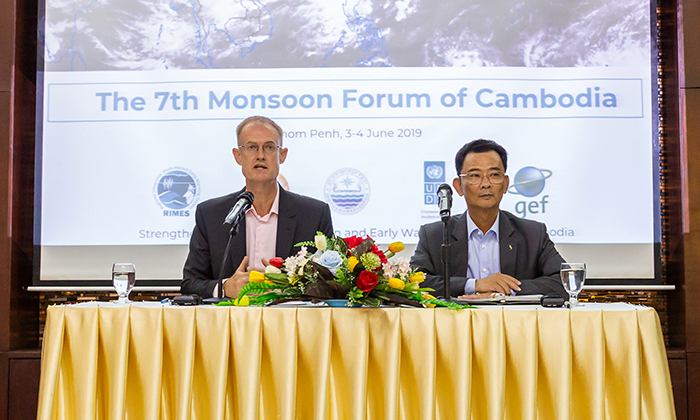
UNDP Resident Representative, Nick Beresford (left) and Deputy Secretary-General, Tonle Sap Authority, MOWRAM H.E. Mao Hak (right) open the 7th Monsoon Forum in Phnom Penh on June 3.
Presentation on the status and direction of climate information and early warning systems in Cambodia, by UNDP Project Manager Muhibuddin Usamah. Click to download.
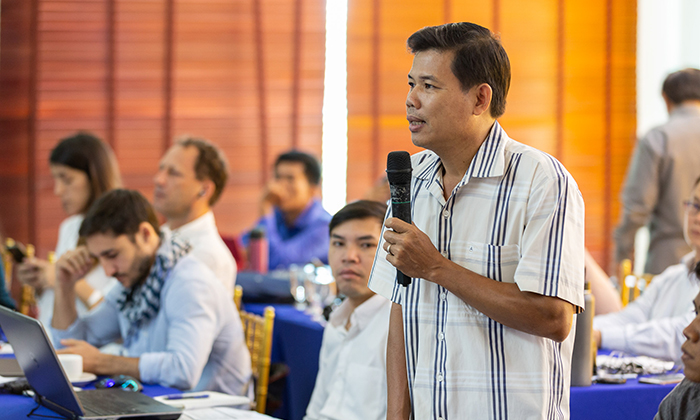
Convened to discuss forecasts and planning for the season ahead, the 7th Monsoon Forum was attended by representatives from the international and intergovernmental institution Regional Integrated Multi-Hazard Early Warning System for Africa and Asia (RIMES), the Department of Meteorology and Department of Hydrology and River Works under the Ministry of Water Resources and Meteorology, the National Committee for Disaster Management, the Ministry of Health, Ministry of Agriculture, Forestry and Fisheries, Ministry of Women’s Affairs, and representatives from international development organisations including UN Development Programme, the World Food Programme, Asian Development Bank, ActionAid, World Vision, People in Need, DanChurchAid, Live and Learn, the International Center for Tropical Agriculture, Life with Dignity, NGO Forum in Cambodia, Development and Partnership in Action, Banteay Srey Organisation, Farmer and Nature Net, Muslim Aid Cambodia, HEKS/EPER, and the Royal University of Phnom Penh. © Manuth Buth/UNDP Cambodia
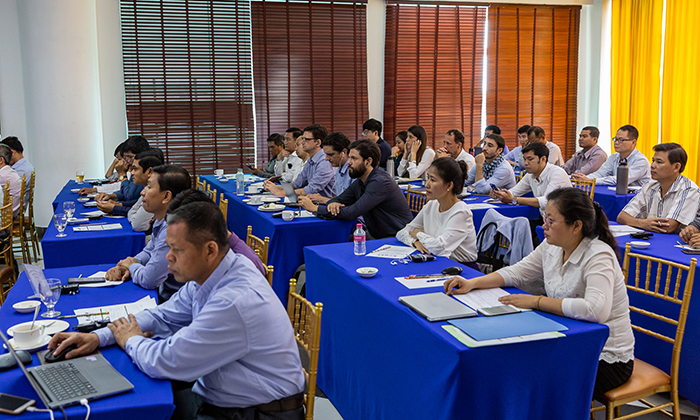
During the forum, attendees were surveyed on the availability, quality and flow of climate information and early warning alerts in Cambodia. A report with recommendations on closing some of the gaps is expected to be released later this year. © Manuth Buth/UNDP Cambodia
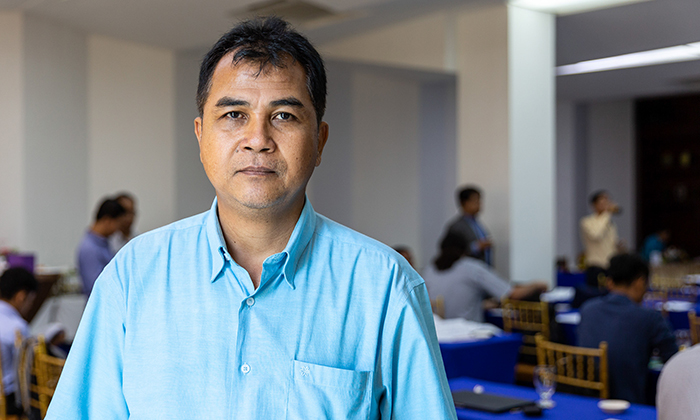
Mr Oum Ryna, Director of Cambodia’s Department of Meteorology. The Department of Meteorology recommends visiting MOWRAM’s Facebook page and website every month for updated seasonal predictions and information. Agriculture and water organisations have been advised to take necessary action during the dry period, and during flash floods, while health-focused organisations advised to take preventative measures related to hot conditions and floods. All sectors have been directed to take fast action in response to severe weather events. © Manuth Buth/UNDP Cambodia
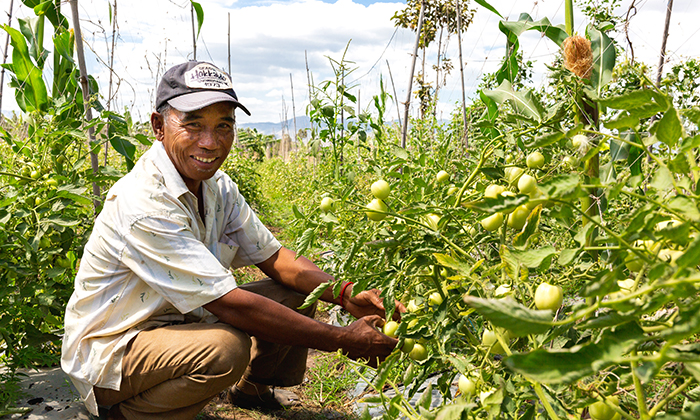
In 2016, discussion during the 6th Monsoon Forum highlighted that for the agriculture sector, available forecasts were too general, dissemination was not effective, and that institutions and communities do not have the capacity to translate information into a view of potential impacts and management strategies. Among other recommendations, the forum highlighted a need for more timely seasonal outlooks, strengthened collaboration between stakeholders and improved outreach to farmers. © Manuth Buth/UNDP Cambodia
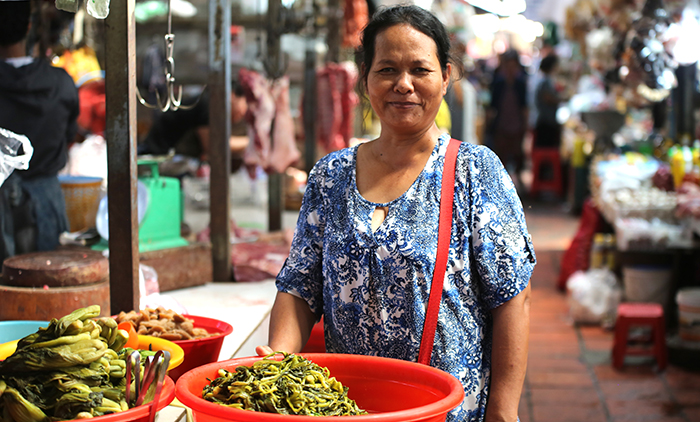
Around the world, climate change is affecting people, ecosystems and livelihoods. The risks are disproportionately high for countries such as Cambodia, which are highly dependent on agriculture (almost 80% of Cambodia’s population live in rural areas, while agriculture, forestry, and fishing constitute around 23.4% of GDP) and which have limited resources to tackle the impacts.
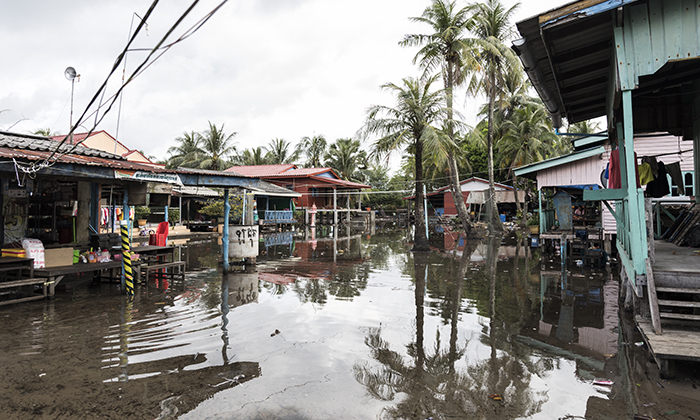
Cambodia faces a range of challenges associated with the onset of climate change, from an increased risk of mosquito-borne diseases such as malaria and dengue, to coastal inundation due to sea level rise, to an increased incidence of floods and droughts affecting agriculture. Climate information and adaptation will reduce risk. © Manuth Buth/UNDP Cambodia

The 8th Monsoon Forum, planned for later this year, will again reflect on the monsoon just passed and will inform forecasting and preparation for season ahead. © Manuth Buth/UNDP Cambodia
About the ‘Strengthening Climate Information and Early Warning Systems in Cambodia’ project
With financing from the GEF-Least Developed Countries Fund, the UNDP-supported project ‘Strengthening Climate Information and Early Warning Systems in Cambodia’ aims to increase Cambodia’s institutional capacity to assimilate and forecast weather, hydrological, and climate information for adaptation, disaster preparedness, and early warning. One of its focuses is to strengthen the capacity of the government, specifically the Ministry of Water Resources and Meteorology, in flood forecasting.
For related photos, please visit click here.
Related articles
‘UNDP Cambodia announces partnership with global climate experts of RIMES, advancing forecasting for the future’, February 2019
For updates on the project 'Strengthening Climate Information and Early Warning Systems in Cambodia’ (EWS Project) and UNDP Cambodia’s broader work, follow @UNDPCambodia on Facebook, Twitter and LinkedIn
For more information, contact Mr. Muhibuddin Usamah | EWS Project Manager, UNDP Cambodia | muhibuddin.usamah@undp.org | Tw: @muhiusamah

